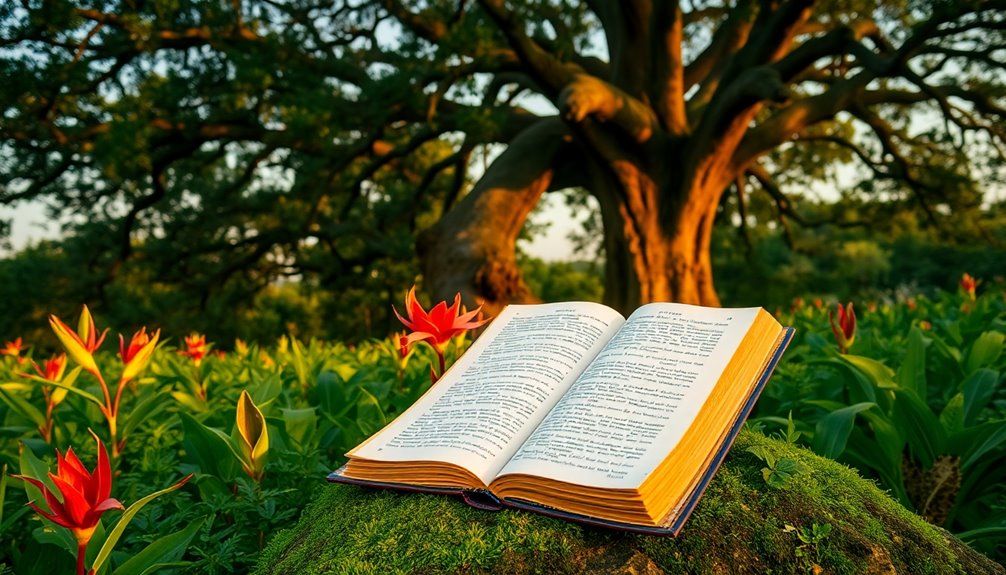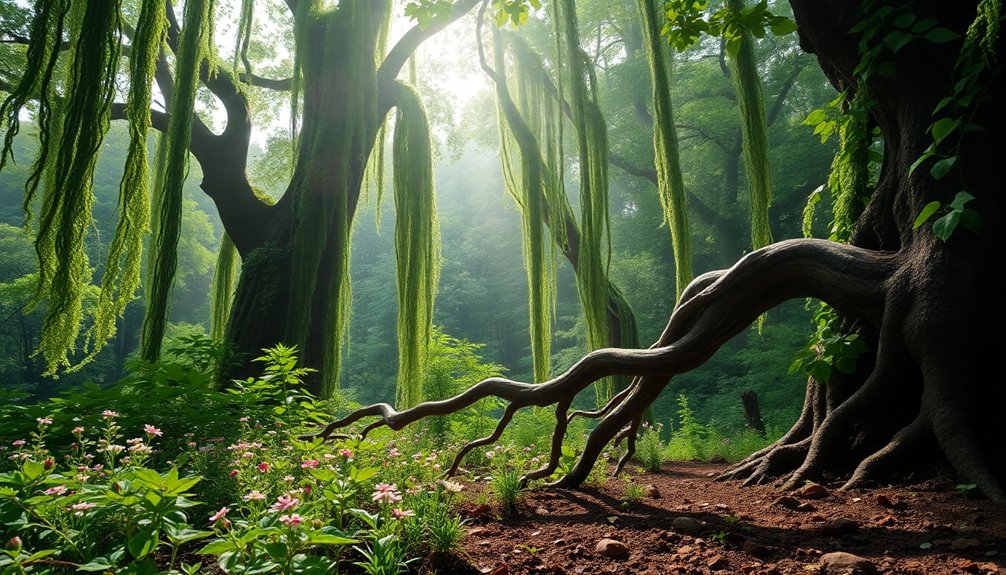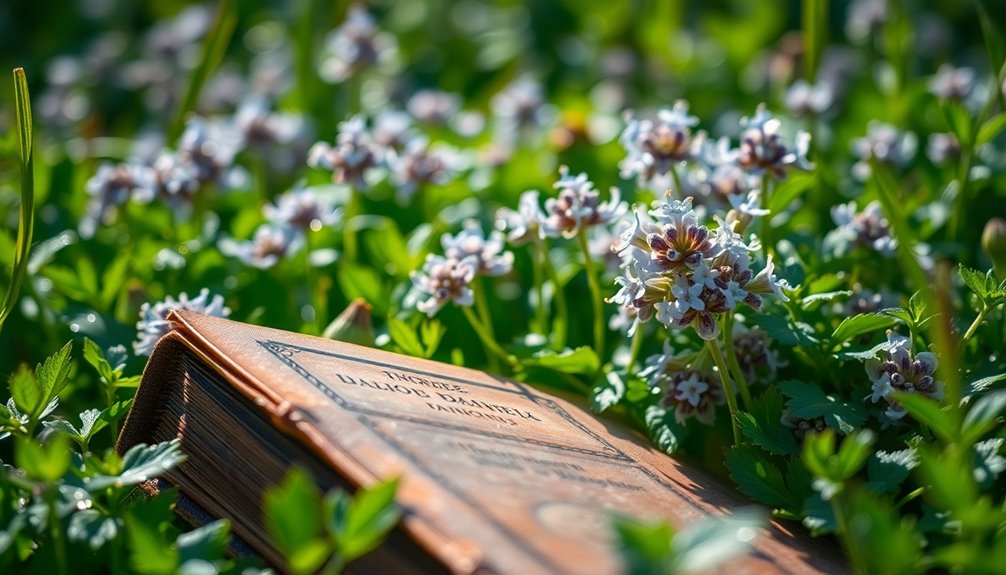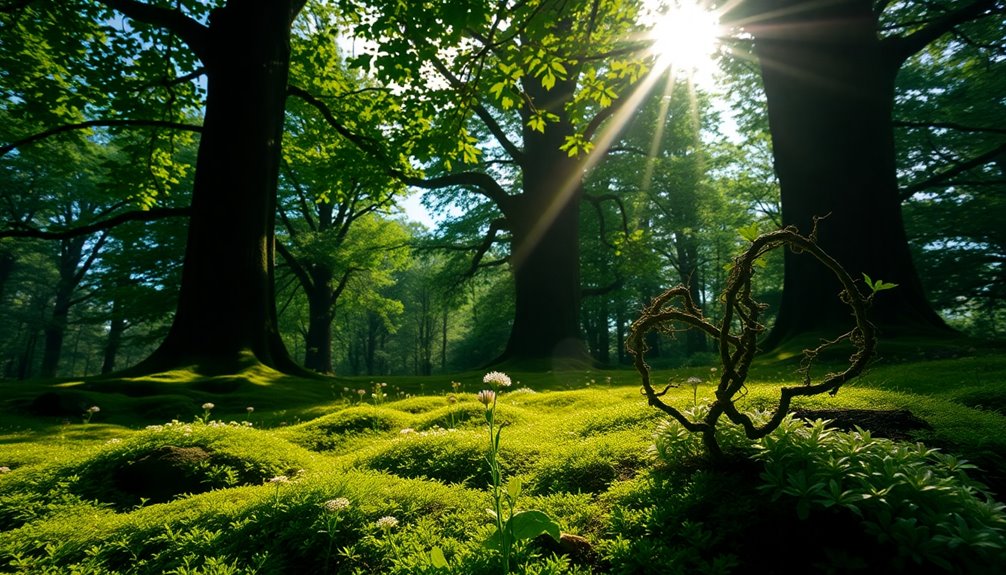In "The Signature of All Things," Elizabeth Gilbert takes you on a profound journey through the life of Alma Whittaker, a passionate botanist in the 19th century. As Alma explores the world of mosses and engages with contemporary scientific ideas, she confronts the constraints of a male-dominated field and her own emotional struggles. Themes of resilience, personal growth, and the intricate relationship between nature and knowledge dominate the narrative. Alma's journey reflects the challenges faced by women in science, making her story both inspiring and significant. Keep going to uncover more about Alma's complex relationships and her adventurous spirit.
Author Background

Elizabeth Gilbert, an acclaimed author, has woven her personal experiences into diverse narratives that captivate readers. Born in 1969 in Connecticut, she graduated from New York University with a BA in Political Science. Her career kicked off as a journalist, and she contributed to esteemed publications like SPIN and GQ.
However, it was her memoir "Eat, Pray, Love" that skyrocketed her into the spotlight, becoming a bestseller and solidifying her status in contemporary literature.
Gilbert's storytelling prowess shines through her ability to blend personal anecdotes with rich narratives. In "The Signature of All Things," her sixth book and second full-length novel, she crafts intricate characters against historical backdrops, showcasing her growth as an author. This novel further demonstrates her commitment to exploring complex themes related to botany and human experience, reflecting a deep understanding of personal growth as seen in literary classics like "David Copperfield." The exploration of generational poverty within her narratives echoes the universal struggles faced by characters in works like "A Tree Grows in Brooklyn." In her writing, she mirrors the resilience of the human spirit, which is a central theme found in Dickens' work.
In 2008, Elizabeth Gilbert was honored as one of Time's 100 most influential people, a reflection of her significant impact on literature and culture.
Her journey from journalist to celebrated author illustrates not just her talent but also her ability to resonate with a broad audience, making her a key figure in today's literary landscape.
Plot Overview
In "The Signature of All Things," you follow Alma Whittaker's botanical journey as she navigates her passion for mosses and the complexities of her relationships.
Her father's wealth gives her the freedom to explore her scientific interests, but it also complicates her emotional world. Engaging in her research fosters a deeper understanding of the mind-body connection that enhances her overall well-being. Additionally, her exploration mirrors the story's themes of nature as a source of healing, emphasizing how the natural world can aid in personal transformation.
As you witness Alma's struggles with love and discovery, you'll see how her familial ties shape her identity and pursuits.
Her story resonates with themes of resilience and strength, highlighting how personal challenges can lead to profound growth and understanding.
Alma's Botanical Journey
Driven by a deep passion for botany, Alma Whittaker initiates a remarkable journey that intertwines her personal growth with groundbreaking scientific exploration. Born in 1800, Alma's fascination with mosses shapes her life, leading her to build a herbarium and secure a position as Curator of Mosses at the Hortus Botanicus in Amsterdam. Here, she dives into extensive research, confronting the scientific advancements of her time.
Throughout her journey, you'll see Alma grappling with:
- Societal Expectations: She wrestles with the limitations placed on women in the 19th century, aiming for recognition in a male-dominated field.
- Emotional Growth: Her relationship with Ambrose Pike serves as both a source of inspiration and conflict, influencing her quest for love and friendship.
- Scientific Discovery: Alma's studies challenge her understanding of evolution, as she parallels her personal experiences with groundbreaking theories.
Ultimately, Alma's botanical journey isn't just about plants; it's a profound exploration of self-discovery and the pursuit of knowledge against the backdrop of an evolving scientific landscape.
Familial Relationships Explored
Familial bonds shape Alma Whittaker's identity and drive her ambitions, revealing the intricate dynamics that influence her journey. Her complex relationship with her father, Henry Whittaker, stands at the heart of her development. As a self-made man, he instills in her both ambition and the heavy burden of familial expectations, pushing her to excel in a male-dominated world.
The early death of her mother, Beatrix, leaves a void that compels Alma to take on the responsibilities of managing the household and business, further entrenching her sense of duty.
Contrastingly, her sister Prudence embodies traditional expectations of womanhood, highlighting the different responses to societal norms within their familial relationships. Alma finds solace in her friendship with Retta Snow, emphasizing the importance of female companionship as a source of emotional support amidst her struggles.
Moreover, her relationship with Ambrose Pike becomes pivotal, representing her romantic aspirations alongside the emotional turmoil of unfulfilled desires and profound loss.
Through these familial connections, Alma's journey unfolds, illustrating how love, duty, and ambition intertwine to shape her destiny.
Themes of Longing

In "The Signature of All Things," you'll find Alma Whittaker's emotional yearning intricately woven into her journey, revealing the tension between her personal desires and societal expectations.
As she navigates her intellectual pursuits, you see how her longing for connection shapes both her scientific endeavors and her relationships. This struggle mirrors themes of resilience and survival in "Life of Pi," emphasizing how personal growth often emerges from confronting adversity. Additionally, her experiences reflect the concept of personal growth through challenges, illustrating how overcoming obstacles fosters deeper self-discovery.
This conflict not only highlights Alma's struggles but also invites you to reflect on the broader implications of female desire in a constrained world. Furthermore, her story embodies the essence of personal growth and the pursuit of one's true potential amidst societal limitations.
Emotional Yearning Exploration
Longing weaves a rich tapestry throughout the narrative of Alma Whittaker, capturing the essence of her emotional struggles and desires. You see her yearning reflected in her intricate relationships, especially with her sister Prudence and her romantic interests. This emotional complexity mirrors the slow, deliberate study of mosses, symbolizing her gradual journey through life.
Alma's unfulfilled longing for Ambrose Pike highlights the tension between societal expectations and her personal desires, illustrating the challenges women faced in the 19th century. Gilbert skillfully showcases Alma's exploration of love, making it relatable and poignant.
Here are three key aspects of her emotional yearning:
- Connection: Alma craves deep relationships, whether with family or romantic partners.
- Understanding: Her desire for comprehension, both of herself and her world, drives her pursuits.
- Freedom: The constraints of her era amplify her longing for personal autonomy in love and life.
Through these lenses, Alma's emotional experiences intertwine with her scientific endeavors, demonstrating how personal yearning fuels her quest for knowledge.
Intellectual Pursuit Connection
Amidst her scientific explorations, Alma Whittaker's intellectual pursuits reveal a profound connection to her emotional yearnings. Her journey through the world of botany intertwines with her quest for love and understanding, particularly as she studies mosses. This slow-growing plant mirrors her own gradual evolution, reflecting her inner struggles with societal expectations and her personal desires.
As you investigate deeper into Alma's life, you'll notice how her profound emotional complexity unfolds, especially in her romantic entanglements with Ambrose Pike. Each relationship she navigates serves as a parallel to her intellectual growth, reinforcing the idea that her scientific ambitions are inextricably linked to her longing for connection.
In the context of the 19th century, Alma Whittaker's experience sheds light on the nuances of female sexual longing, emphasizing the delicate balance between ambition and emotional fulfillment.
Her quest for knowledge isn't just an academic endeavor; it mirrors her search for meaningful relationships and deeper connections. Ultimately, Alma's intellectual pursuits highlight the intricate interplay between inquiry and longing, showcasing how one fuels the other throughout her life.
Societal Expectations Conflict
Maneuvering the rigid confines of 19th-century societal expectations, Alma Whittaker finds herself at a crossroads between ambition and desire. You witness her struggle as she grapples with the limitations imposed on women while yearning for deeper connections.
Alma's journey becomes a universal tale of longing, reflected in three key areas:
- Ambition vs. Romance: Alma's complex relationship with Ambrose Pike highlights her desire for emotional intimacy, pitted against societal norms urging her toward marriage.
- Passion for Botany: Her dedication to botany serves as a metaphor for her longing to break free from gender roles, showcasing her relentless pursuit of knowledge despite societal constraints.
- Experience of Loss: The death of her mother thrusts Alma into responsibility, intensifying her emotional landscape and amplifying her need for acceptance and love.
Through Alma's experiences, you see how the expectations of femininity conflict with personal fulfillment.
Gilbert critiques these restrictions, revealing Alma's relentless spirit as she navigates her dual desires for scientific exploration and emotional connection.
Her story resonates, making Alma's journey a universal reflection of longing that transcends time and societal boundaries.
Character Development
In exploring Alma Whittaker's character development, you'll find a rich tapestry woven from her experiences as a dedicated botanist in the 19th century. Alma's journey is universal, reflecting the complexities faced by women pursuing intellectual ambitions during a time when societal constraints loomed large.
Her relationships with her sister Prudence and husband Ambrose Pike reveal her emotional depth, showcasing the internal struggles of balancing love and ambition. As you follow her path, you'll witness Alma evolve from a sheltered girl into a respected botanist, maneuvering through the challenges of a male-dominated field. Her journey illustrates the importance of self-reflection and mindfulness, which can empower individuals to make intentional choices in their lives. Additionally, her story mirrors the resilience found in many historical fiction works that celebrate strong female protagonists who defy societal expectations.
Her intellectual growth is intertwined with personal loss, illustrating the tension between her scientific aspirations and emotional yearnings. This contrast makes her multifaceted and relatable, as you see her grapple with expectations placed upon her by society.
Throughout the narrative, Alma's resilience becomes a powerful symbol of growth and self-discovery. You'll appreciate how her character not only embraces her passion for botany but also confronts the limitations of her time. Alma's journey echoes the themes of human spirit, showcasing the triumph over challenges similar to those found in narratives like *Unbroken*.
Ultimately, Alma's journey invites you to reflect on the broader themes of pursuit, knowledge, and the quest for identity in a world that often seeks to confine.
Literary Significance

In "The Signature of All Things," you'll see how Elizabeth Gilbert highlights the often-overlooked contributions of women in science, making Alma Whittaker a powerful figure in a male-dominated field. The interconnectedness of lives, driven by both personal and scientific pursuits, enriches the narrative and invites you to reflect on the broader implications of knowledge. Nature itself emerges as a character, shaping the journeys of those who study it and emphasizing the significance of the natural world in our lives. Additionally, the novel explores the complexities of emotional connections that mirror the intricate relationships found in both human and botanical worlds. By showcasing Alma's journey, Gilbert echoes the importance of recognizing hidden contributions from marginalized voices in the scientific community. Coates' exploration of systemic racism in "Between the World and Me" similarly encourages a deeper understanding of the broader societal structures that shape individual experiences.
Women in Science
Although often overshadowed by their male counterparts, women in science have made significant contributions that deserve recognition, as illustrated in Elizabeth Gilbert's "The Signature of All Things." The novel's protagonist, Alma Whittaker, embodies this struggle for acknowledgment and respect in a male-dominated field during the 19th century.
Alma's journey is a universal tale of perseverance, challenging societal norms while passionately pursuing her love for botany.
Through Alma, Gilbert highlights key aspects of women's experiences in science, including:
- Struggles for Recognition: Alma faces constant challenges in gaining acknowledgment for her work, reflecting the broader battle women scientists encounter.
- Societal Expectations: The novel illustrates how societal norms limit women's opportunities, yet Alma's determination shines through.
- Intellectual Curiosity: Alma's relentless pursuit of knowledge serves as a demonstration of the passion that drives women scientists, regardless of the era.
Gilbert's portrayal emphasizes that women in science deserve equal recognition, promoting awareness of their historical significance and inspiring future generations to break barriers in academia.
Interconnectedness of Lives
Weaving together the lives of its characters, "The Signature of All Things" highlights the profound interconnectedness of personal experiences and scientific discoveries. Alma Whittaker's journey showcases the crucial contributions of women in science, illuminating their often-overlooked roles in advancing knowledge.
The novel traverses diverse locations, from Kew Gardens to Tahiti, revealing how these environments shape not just characters' identities but also their relationships.
As Alma grapples with her realizations about species evolution, she embodies the interconnectedness of all living beings, paralleling her emotional and intellectual growth. Each character's story intertwines with another's, demonstrating how individual lives influence one another in unexpected ways.
Gilbert's narrative further challenges societal norms and emphasizes the collaborative nature of scientific inquiry, reinforcing the idea that discoveries are rarely made in isolation.
Through these interwoven lives, the novel invites you to reflect on the shared human experience, reminding you that every discovery and every struggle contributes to a broader tapestry of knowledge.
In "The Signature of All Things," interconnectedness isn't just a theme; it's the very essence of life, science, and the pursuit of understanding.
Nature as Character
Nature plays a central role in "The Signature of All Things," acting almost as a character itself within the narrative. It shapes the experiences of Alma Whittaker and reflects her journey through both personal and intellectual landscapes. The intricate relationship between nature and humanity is essential, showcasing how plants influence the characters' lives in profound ways.
Here are three ways nature serves as a character in the novel:
- Symbol of Growth: Mosses represent slow and steady growth, paralleling Alma Whittaker's own evolution and quest for knowledge.
- Emotional Reflection: Gilbert's rich descriptions of plant life provide a vivid backdrop, mirroring the emotional states of the characters and highlighting their inner struggles.
- Cultural Critique: Through Alma's observations of the natural world, the narrative critiques societal norms, emphasizing the often-overlooked contributions of women in science.
As you explore the story, you'll see how nature acts as a source of inspiration, knowledge, and connection that transcends geographical boundaries, ultimately enriching Alma's journey in ways that are both enlightening and transformative.
Scientific Exploration
In the heart of 19th-century Amsterdam, Alma Whittaker immerses herself in the world of mosses, maneuvering through the intricate web of scientific exploration that defines her life. As the Curator of Mosses at the Hortus Botanicus, she stands at the forefront of botanical research, showcasing her significant role in a male-dominated field.
Alma's work reflects her meticulous and patient approach, embodying the slow, deliberate pace of nature's changes. Her engagement with contemporary scientific discourse deepens as she later encounters Charles Darwin's "On the Origin of Species," which profoundly influences her understanding of evolution.
Despite societal constraints, Alma navigates her intellectual journey with resilience, continually fighting for recognition in her contributions to science. The narrative not only highlights her dedication to moss research but also emphasizes the broader theme of overlooked women in science.
Alma's struggles and triumphs mirror the advancements in scientific thought during her time. Through her story, you witness the intertwining of personal growth with the evolution of scientific exploration, showcasing the essential role women like Alma Whittaker played in shaping the botanical community.
Reception and Accolades

Though initially released with modest expectations, "The Signature of All Things" quickly captivated readers and critics alike, cementing its place in literary discussions of 2013. Elizabeth Gilbert's novel received widespread acclaim, and you can see why it stood out.
Here are three remarkable accolades that highlight its success:
- It was named one of the Best Books of 2013 by multiple publications, showcasing its critical acclaim and popularity.
- The novel earned a nomination for the 2014 Carnegie Medal for Fiction, further recognizing its literary significance and contribution to the genre.
- Notable critics like Barbara Kingsolver and Elizabeth Day praised Gilbert for her complex characters and rich themes.
Publishers Weekly commended the book for its "unhurried, intelligent narrative," solidifying its reputation as a thoughtful work.
The profound exploration of botanical themes and female contributions to science not only captivated audiences but also provided a unique perspective within historical fiction.
Gilbert's ability to weave intricate narratives with depth and insight makes this novel a standout, ensuring it resonates with readers long after its publication.
Historical Context
Set in the 19th century, "The Signature of All Things" immerses you in a transformative era, showcasing remarkable advancements in botanical science alongside the emergence of evolutionary theory.
The novel reflects the societal norms of the Victorian era, particularly the constraints placed on women like Alma Whittaker, who navigates a male-dominated scientific landscape.
Historical figures such as Charles Darwin and Alfred Russel Wallace influence Alma's journey, as their groundbreaking ideas shape the scientific discourse of the time.
You'll see how these developments intertwine with the broader context of colonial exploration, where botanical expeditions often served imperial ambitions and the quest for natural resources.
The narrative captures the tension between emerging scientific thought and the traditional spiritual beliefs prevalent during this period.
It places Alma at the intersection of these ideas, highlighting her struggle to carve out a space for herself in a world where her gender often dictated her opportunities.
As you explore the story, you'll appreciate how the historical context not only frames Alma's experiences but also enriches the overarching themes of discovery and inquiry that resonate throughout the novel.
Personal Journey of Alma

Alma Whittaker's journey is one marked by both intellectual brilliance and emotional turbulence. From her early days in Philadelphia, you see her passion for botany ignite, nurtured by her wealthy upbringing.
However, life throws challenges her way, particularly after her mother's death. As she manages her household, you watch her resilience shine through, balancing family duties with her love for plants.
Her romantic life weaves complexity into her journey. With Ambrose Pike, she experiences a deep emotional connection, yet his refusal to consummate their marriage forces her into profound self-discovery. This heartbreak reflects a universal theme of seeking fulfillment and understanding in relationships.
As you explore her life, you'll notice three pivotal aspects:
- Intellectual Pursuit: Alma's relentless quest for knowledge fuels her passion for botany.
- Complex Relationships: Her bond with sister Prudence and friendship with Retta Snow shape her experiences.
- Professional Growth: As Curator of Mosses in Amsterdam, she navigates a male-dominated field, asserting her place in science.
Alma's journey is a universal reflection of ambition, love, and the quest for identity.
Gender Roles in Science
As Alma Whittaker navigates her personal and professional challenges, the broader landscape of gender roles in science comes into focus. In the 19th century, women like Alma faced significant obstacles in their pursuit of scientific knowledge. Limited access to education and a male-dominated field often marginalized their contributions. Alma defies these societal expectations, passionately pursuing her love for botany despite the constraints placed on her.
Gilbert crafts Alma as a complex character, embodying intellectual curiosity and emotional depth. Her journey highlights the persistent struggles female scientists endured to gain recognition and respect. You see how gender roles shaped not only Alma's career but also her relationships, as she navigates a world that often dismisses her expertise.
The narrative critiques the historical exclusion of women from scientific discourse, showcasing Alma's relentless efforts to assert her place within it. By emphasizing her accomplishments, the novel pays homage to the often-overlooked contributions of women like Alma Whittaker, reminding us of the essential roles they played in shaping the scientific community, even when overshadowed by rigid gender norms.
Nature as a Character

Embracing the wonders of the natural world, "The Signature of All Things" treats nature as an essential character that profoundly influences Alma Whittaker's journey. Through her exploration of botany, you see how nature intertwines with her intellectual and emotional growth. The novel highlights the significance of mosses, symbolizing Alma's patient quest for knowledge, which mirrors the broader themes of evolution and change.
Consider how nature shapes Alma's experiences:
- Interconnectedness: Gilbert's rich descriptions of diverse landscapes reveal how all living things are linked, affecting Alma's relationships and understanding of the world.
- Scientific Inquiry: As Alma cultivates her herbarium, she uncovers the beauty and complexity of plant life, showcasing her determination to grasp the intricacies of nature.
- Emotional Reflection: Nature acts as a living entity, reflecting Alma's inner struggles and shaping her destiny, serving as both backdrop and catalyst for her quest for truth.
In this way, nature isn't just a setting; it's a transformative force that guides Alma Whittaker's journey toward discovery.
Legacy and Impact
The profound influence of nature in "The Signature of All Things" sets the stage for a broader exploration of legacy and impact within Elizabeth Gilbert's work. This novel not only showcases her storytelling prowess but also cements her legacy as an essential voice in contemporary literature.
By focusing on the contributions of overlooked women in science, Gilbert highlights their struggles and achievements in a male-dominated 19th-century society.
Through her richly developed characters and emotional depth, you're invited to reflect on how personal growth intertwines with scientific discovery. This theme resonates with readers, encouraging them to appreciate the interconnectedness of life, nature, and the pursuit of understanding.
The acclaim surrounding the novel, including multiple "Best Book of 2013" honors and a nomination for the 2014 Carnegie Medal for Fiction, underscores its significant impact within the literary community.
As you explore this botanical epic, you'll find that Gilbert's work not only entertains but also inspires a deeper appreciation for the legacies of those who dared to challenge societal norms. Her exploration invites you to recognize the profound stories that often remain untold in the annals of history.
Community Engagement

Community engagement around "The Signature of All Things" cultivates a vibrant environment where readers can immerse themselves in both fiction and nonfiction literature.
Platforms like "The Book Cafe" play an essential role in fostering this engagement, as they provide a space for literary enthusiasts to connect over shared interests.
With a following of 2.6K as of December 2024, this community thrives on meaningful discussions and shared experiences.
Here are three ways you can get involved:
- Join book club discussions: Participate in conversations that highlight various themes and narratives, enriching your understanding of the text.
- Attend events featuring emerging writers: Engage with new voices in literature and contribute to the ongoing discourse surrounding significant works.
- Share your insights: Whether through social media or in-person gatherings, sharing your thoughts helps build a collective literary experience.
Conclusion
In "The Signature of All Things," you discover a dazzling dance between desire and discovery. The lush landscapes and layered lives leap from the page, leaving you longing for more. As you reflect on the rich relationships and resilient research, you realize the profound power of nature's narrative. This botanical epic beckons you to embrace your own curiosity and connection, reminding you that every story, like every seed, holds the promise of potential and profound transformation.



